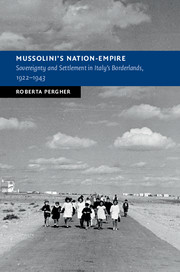Crossref Citations
This Book has been
cited by the following publications. This list is generated based on data provided by Crossref.
Deak, John
2018.
Habsburg Studies within Central European History: The State of the Field.
Central European History,
Vol. 51,
Issue. 1,
p.
53.
Di Pasquale, Francesca
2019.
On the Edge of Penal Colonies: Castiadas (Sardinia) and the “Redemption” of the Land.
International Review of Social History,
Vol. 64,
Issue. 3,
p.
427.
Reichardt, Sven
2020.
Beyond the Fascist Century.
p.
51.
Cooper, Frederick
2022.
Italy and the Suez Canal, from the Mid-nineteenth Century to the Cold War.
p.
381.
Guidi, Andreas
2022.
Storia italiana, storia mediterranea: nuove prospettive su un passato imperiale e coloniale.
ITALIA CONTEMPORANEA,
p.
350.
Wand, Ann
2023.
Segregation in Language Education.
p.
55.
Cinotto, Simone
2023.
The fascist breadbasket: food, empire, and modernity in Italian East Africa, 1935–1941.
Journal of Modern Italian Studies,
Vol. 28,
Issue. 3,
p.
296.
Budabin, Alexandra Cosima
2023.
Heritage politics in the case of Black Lives Matter in Bolzano-Bozen, Italy.
European Journal of Cultural and Political Sociology,
Vol. 10,
Issue. 4,
p.
577.
Palumbo, MariaLuisa
2023.
Histories of the Channel of Sicily: Architecture, Colonization, and Migrations across the Mediterranean Shores (1932–43).
South Atlantic Quarterly,
Vol. 122,
Issue. 2,
p.
257.
Wendt, Christopher
2024.
‘For everything, the local priest is a helper in adversity’: Catholic clergy and the new order in post-Habsburg Tyrol.
European Review of History: Revue européenne d'histoire,
Vol. 31,
Issue. 5,
p.
759.
الرويعي, حيدر
and
عبد الله , احمد
2024.
التطورات السياسية والعسكرية الدولية التي مهدت لانطلاق حملة شمال أفريقيا خلال الحرب العالمية الثانية.
Journal of Kufa Studies Center,
Vol. 1,
Issue. 71,
p.
169.
Asquer, Enrica
2024.
Il caso Blinderman. Naturalizzazione, revoca della cittadinanza e antisemitismo nell'Italia fascista.
ITALIA CONTEMPORANEA,
p.
193.
Bresciani, Marco
2024.
Fascist ideas, practices and networks of ‘Empire’: Rethinking Interwar Italy as post-Habsburg history (1918–1938).
Philosophy & Social Criticism,
Vol. 50,
Issue. 4,
p.
584.
Downs, Laura Lee
2025.
When social provision became a bordering practice: The association ‘Assistance to Redeemed Italy’ and children’s welfare in Italy’s northeastern borderlands, 1919-1939.
Childhood,
Vol. 32,
Issue. 1,
p.
20.



